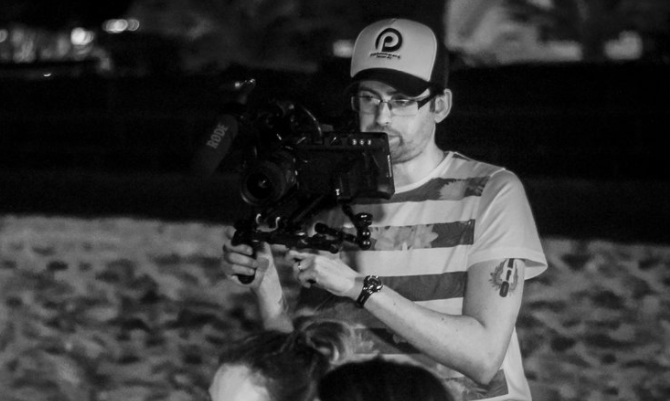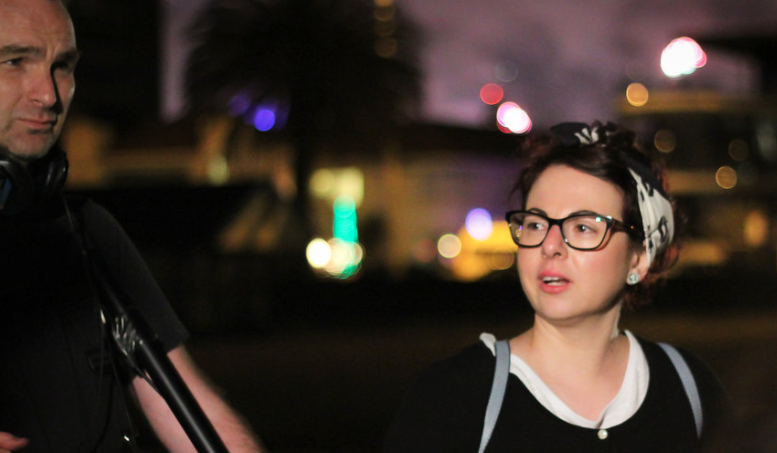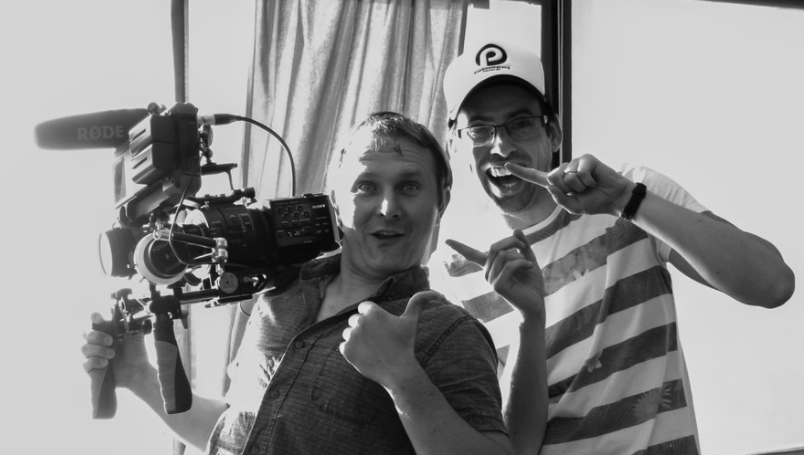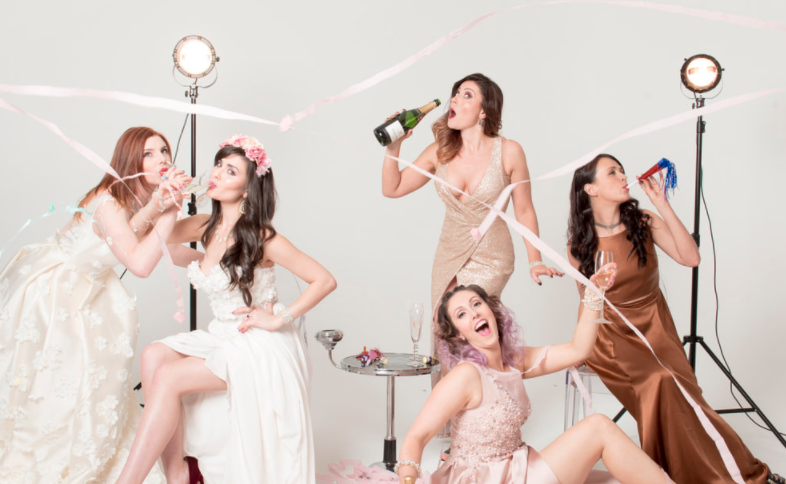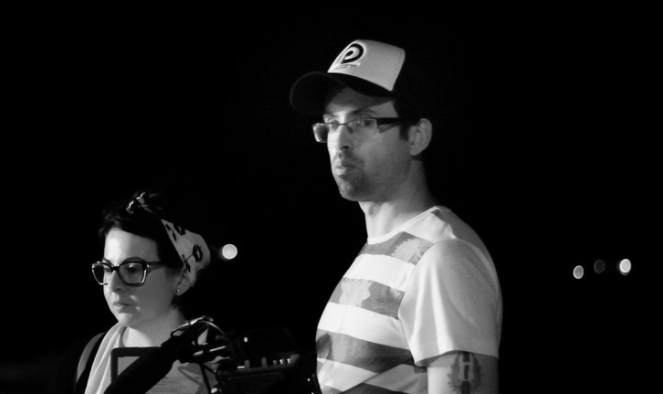As a result of their work on the Made In Melbourne Film Festival, Ivan Malekin and Sarah Portelli are well known names within the Melbourne filmmaking community. This past New Years Eve, Malekin and Portelli set out to achieve the extraordinarily difficult. Shot in a single night, the craziest and most chaotic night of the year – NYE – and relying on improvisation in acting and camera, Friends, Foes & Fireworks is an ambitions Australian Mumblecore / drama film exploring relationships, love, friendship and the truths we try and fail to keep to ourselves. We had the chance to talk to Ivan and Sarah about their experiences as independent filmmaker and the unique undertaking of Friends, Foes and Fireworks.
What first got you interested in filmmaking?
I: As a teenager and in my early twenties I wanted to be a novelist. I would spend my spare time reading fantasy books and working on fantasy novels, hunched beside my bed, notebook and pen in hand, writing epic sagas about good and evil, magic and warlocks, fantastical realms and creatures. Even managed to finish a first draft of a young adult fantasy series in my mid-twenties, which I have been telling myself I will go back to and redraft these last couple of years, but haven’t managed to find the time and discipline.
Anyway, I went on to study Professional Writing and Editing at Victoria University, the dream of being a writer still firmly alive, but it was in Uni that I helped a friend, Heath Novkovic, make a couple of short films before culminating in a hapless feature called Shades of the Soul, about a group of soldiers fighting demonic possession in an isolated jungle. I had a hand in the script and watching your words being interpreted before your eyes and brought to life by actors had an effect on me; it was immediate, creativity through collaboration. Whereas writing was an isolating pursuit, film was gregarious, shared ideas and energy, and it was something I immediately enjoyed. From there I formed Nexus Production Group with my friend Patrick Siscar and we made three short films back to back. None of them are any good, but it was enjoyable, and from there I’ve just kept making films.
S: I have always been a creative being. As a child I would paint, dance and create stories and imaginary worlds, as well as write and illustrate my own picture books, all while wearing silly homemade costumes I put together myself from household items and scraps. So I guess, for me, filmmaking was a natural extension of myself. An extension of who I was, who I am today and how I express myself artistically now as an adult is that child, just in a different (and perhaps more cynical and jaded) form and now in the shape of a director and writer. In 2006 while the creative child was repressed I fell into an Art Department role and that mistaken identity raised that child up again, so I embraced my natural creative skills. This event showed me what I should be doing with my life, and that is working on film sets. When I feel lost as an artist I remember that child and then I am ok with who I am and where I am. When I found my tribe in 2009, after three years of working in Art Department I met Ivan and we have been working as duo under Nexus Production Group ever since. I directed my first film, Dusk in 2013 and that was my step away from my passion for Art Department and a leap into directing and writing my own screenplays as the focus.
Friends, Foes and Fireworks was shot over the course of a single night. What made you decide to do this?
I: We didn’t initially go into the film with the mindset this must be done in a single night, but it eventually developed into that. The original concept was we wanted to make a no-strings feature film and we wanted to do it quickly; no budget, no expectations, no egos – film for the love of film. It was actually a bit of a response to two protracted and trouble-plagued productions I was on where I wasn’t having fun in the filmmaking process, but endlessly dealing with issue after issue. So Friends, Foes & Fireworks was a way to rediscover my passion for film again.
Sarah and I bounced ideas off each other and when we settled on the New Year’s Eve storyline, it made sense to film it all in a single night because NYE is that one special night and it would add to the realism. Even then, once I drew up a rough schedule and it was running at 14-15 hours, we put it to the cast if they really wanted to attempt to do this over one night; we could split it into two nights if required. The cast overwhelmingly wanted to stick to one night; it was more special that way, and that was galvanising. And when I put the schedule to our DOP, Stephen Ramplin, his response was inspiring too, ‘well, if it has to be done, we’ll do it.’ I love that attitude. I read somewhere that the average person will sleep for 9125 days in their lifetime so plenty of time for that. But how often will we have a chance to do something like this? Sleep can wait. Let’s film.
S: Why not, seems like a logical thing to do, right? No really, we thought that it would be fun and also challenging to shoot a feature film in one night. It was a project that we were looking at as a ‘good time’ piece with friends and actors we have worked with in the past on various projects. We were all drawn to and driven by the desire to have everything captured in the moment. If we had stopped after midnight we would not have revived the same result we did in the end. The momentum would have been lost.
What were the benefits of such a tight shoot? What were the drawbacks?
I: The drawbacks are sometimes we would have liked to spend more time on a scene, on a shot, another take, but the schedule forced us to move on. The first half of the night was key and the most crammed in terms of moments we needed to capture – we had to be at a certain spot at midnight to capture the fireworks so it was go, go, go right from the start. Another drawback is continuity – when your camera is entirely improvised on the night and you have no time for block-throughs things are not going to be the same from take to take (when there is time for another take) in terms of character movements and dialogue because dialogue is entirely improvised too. There are no ‘marks to hit’ as they say so getting from one shot to the next in the edit is challenging but we knew that would be the case going in.
The benefits are you are forced to strip back film to only the essentials. Bare minimum crew, practical lighting, no, we can’t have that extra take for safety. You are also forced to think on the spot, adapt as you go, and trust your instincts – it’s creativity on the run and there is something invigorating about that. And, obviously, we’ve made an entire feature in a single night. For better or worse, we’ve done it, and we already have ideas for other quickfire features – such was the experience we had we want to do it again.
S: Time was a benefit. We shot a feature film in one night, at 7 locations, which usually takes crews at least months to complete due to working around everyone’s schedules and various locations. The drawbacks again were time, as we had to work to the tight schedule, especially when we had to capture the fireworks exactly at midnight as we could not get that moment in time back. Sometimes I felt a little rushed and had to trust that the two long 2 takes I directed was enough footage and that sort of thing. But we were ahead of schedule in the end and wrapped an hour early, so Ivan created a perfectly planned out runsheet for us.
What made you choose New Year’s Eve as the backdrop for your story?
I: NYE is a time of assessing one’s life and making resolutions for change. Our characters are all either facing uncertainty in their lives, have decisions to make or goals to chase, and the connotations of NYE add to this. It is also a party, a time to get together with friends and celebrate past memories and make news ones. We like that dichotomy of the night – the lighter and darker side – and we tried to bring out both in the film. And, finally, the unpredictability of the night correlates with the unpredictability of the film and shooting style – we didn’t know what was going to happen in terms of crowds and celebrations and we liked that. We were in for an adventure.
S: We have never really been big on NYE and have always had a boring or overrated experience, so we thought we would just make a film since that is what we loved to do. Of course the production is more interesting to others when you tell them that we actually shot in the moment, on NYE, but the ‘shooting on NYE, in one night’ is much more than a gimmick. The film brings up a lot of questions and has a running theme of the characters thinking to themselves “who do you want to be next year?” Which is a NYE, New-Years-Resolution kind of thing that worked well with the story line and the characters scenarios.
You directed Friends, Foes and Fireworks together. How do you find working as a directorial team?
I: As husband and wife we do so many things together so extending that to directing seemed natural. During pre-production, it meant having someone to bounce ideas off, someone to reel in your more wild ideas or flesh out your more nascent ideas and vice versa.
It was also practical as at a certain point in the story the characters split up and scenes occur simultaneously in different locations – the only way to do that, and complete the film in a single night, was to actually shoot the scenes simultaneously with two separate directors and separate crews.
While we were together Sarah handled most of the directing as I focused more on second camera – she had an overview of the whole scene and performances across the board while my view was narrowed to any particular actors I was filming (even when we were in the same room, there were still scenes and conversations taking place simultaneously just like real life – it was crazy).
But overall, it was a positive experience and something I would do again as long as it is the right person as I have had poor experiences with co-directing too – basically if you gel as a team, it works.
S: I have always been skeptical of duos when it comes to writing and directing, as I always have a set way I see myself shoot or direct a scene as I write it. For this I had to talk about it with another director on the spot due to the improv style of the shoot and no shotlist. Having two directors in this case was due to logistics of the shoot, we had to shoot and direct scenes simultaneously, but personally, I found it good and not difficult because I know Ivan really well as a person and as a director. So I was able to debate and have my say on set more freely then I would with a stranger because I was comfortable with him. There were a couple of times in pre- production that he saw a character or a character’s interaction with another playing out a different way to me, as I am more conservative in some instances where he is more liberal. We talked it out together and also with the actors and it just worked, we found that balance or that middle ground as some would say. The good thing about two directors is that you get a varied view to your own.
What are some of your main influences, both in style and content?
I: We were influenced by the Mumblecore movement. The work of Greta Gerwig, Joe Swanberg and the Duplass brothers. We have been watching quite a lot of Mumblecore films lately and we like how authentic they are, the characters feel like real people going through real problems and dealing with the uncertainty of life. The conversations come from the heart. Take Drinking Buddies as an example, which deals close friends and unrequited mutual attraction; it’s such a simple story, but a lot of people can relate as it is something reminiscent of real life. The dialogue in that film was completely improvised too and as a result the dialogue sounded so natural because conversations in real life don’t always flow and we don’t always have that clever comeback. However the film had high production values, and for me that is important.
Mumblecore is often associated with poor production quality and bad sound, hence the name, but if you are going to make a film you still need to get the fundamentals right to make the film easy for the audience to access. I also feel FFF is not a straight Mumblecore film, but a hybrid of Mumblecore and drama, meaning it actually has more plot and interconnecting story lines than a typical Mumblecore. That stems from my own love for quality drama and my own experience as a filmmaker producing straight narrative drama.
S: Main influences were without a doubt our love for character development and meaty storytelling firstly mixed in with the weird and interesting things we have heard and seen actors do and talk about on set and at film events. It is very much a compilation or a mash up of the characters we have had to deal with as directors over the years, you meet all sorts. Secondly, we were inspired by other indie films both here and in the US that focused on the Mumblecore genre, which we first discovered through our roles with programing Made In Melbourne Film Festival.
You run the Made In Melbourne film festival. Has being part of the festival had an impact on you creatively, as filmmakers?
I: Definitely, we watch a lot of films so it helps us see what works and what doesn’t, and we can’t help but be influenced or inspired by some of the things we see. There is a lot of talent in Melbourne. For instance, we saw Sophie Townsend’s Pretty Good Friends through Made In Melbourne, dubbed Australia’s first mumblecore film, and we were introduced to the work of Nic Barker through MIM. One of his shorts – Dead Sharks – was an influence on Friends, Foes & Fireworks. There is also Lazybones by Michael Jones and Caitlin Farrugia, another terrific local mumblecore film and another example of what can be achieved with no money but a talented team and a whole load of creativity, and this in turn, can’t help but inspire our own creativity.
S: Hell yes. We go to a lot of indie events and meet a lot of indie filmmakers though our festival roles, so who we meet and the work they produce certainly impacts us as creatives, because I believe that we all thrive off the work of others through inspiration and energy. In our roles for the festival we are blessed with the opportunity of watching over 100 film submissions each year. That alone impacts us as creatives and gives us insight into what we don’t want to do in our films, what we wish to do or one day aspire to do, but also when we see that we like, we can admire that. That insight and upper hand certainly impacts us as creatives, individually and when we come together as Nexus Production Group to produce our own work.
What do you think makes a great film?
I: Story is the key. A film can look spectacular and have the best effects, the best actors, but if the story does not grab you and the characters are not engaging then none of that matters. These days filmmaking is so accessible that everyone wants to call themselves a filmmaker, but not enough attention is paid to the fundamentals and the cornerstone of what film is; visual storytelling. If you don’t get that cornerstone as strong as it can be there is little point in building everything else on top – it will always be flawed no matter how well you execute everything else.
S: A great script and a well thought out and researched one that has gone through many drafts and caused the writer much anguish, while at the same time had them experiencing much joy and a sense of accomplishment by the end of the process. That is the base. You can’t dress up shit and sell it as gold, people will notice no matter who the DP is shooting those wonderful shots or whichever A-list actor you have leading the film.
What’s next for Nexus?
I: I am producing a feature film called Choir Girl, which will be shooting in April. It is a black and white arthouse drama with deals with a lonely photographer who becomes obsessed with an underage prostitute. It is quite gritty, a little controversial and very challenging in terms of content, locations, characters … but it is the challenge that draws me as a filmmaker because if I am not testing myself, learning and growing with each project, what is the point?
Find out more about Choir Girl via the website – http://www.choirgirlfilm.com/
S: Ivan and I are working on different projects. I am still working on producing my short film and awareness project, Daughter which is complete. I want to move into Education with the project and have it used as a teaching guide to spread some messages about social justice for women. Daughter is also on Fan-Force, a cinema on demand platform and we have some important screenings coming up to coincide with some big events for women’s issues starting in March. I also want to develop Daughter into a TV series down the track, so writing and developing that concept and pitch is keeping me busy. Check out the website and follow the progress – http://www.daughterstkilda.com
Do you have any advice for someone who wants a career in filmmaking?
I: Pick up a camera and shoot something, give yourself leeway to make mistakes and fail. I know previously I went on and on about story being key (and it is) but when you are just beginning you are not going to get it right and that is okay. Just don’t expect the world to bow down at your feet when you finish your first crappy little short. Well done. Now take the rejections, learn from it, and do it again. But better. I never went to film school so I learnt just by doing. I look back at my early work and it was terrible, but I kept going, learning through trial and error and I like to think that my work today is a little less terrible. Not everyone’s cup of tea, but not terrible. So be patient because it takes time – what is it that they say – 10 years to become great at something? In other words, don’t give up.
S: So much I could say. Here’s some of it. The thing you will learn very quickly when you dive into filmmaking, (because there is no such thing as slowly dipping your toes in to test the temperature) is that you have to have a tough outer shell and you have to use that shell as your shield everyday. It is damn hard and it will test you. It is tough out there and not everyone is going to like or understand you or our your work for that matter and that is ok, art is subjective, don’t take it too personally. Also, be careful who you choose to work and associate with, it sets a standard for the work you produce and some will want to be up for the ride, but not for your benefit, just their own. Lastly, have passion for each and every project you produce, because when you do it shows and it is electrifying. You will attract the right people, who will be drawn to you for your honesty and your projects will blossom and grow bigger than you imagined. Then people will be asking you your advice for those who want a career in filmmaking!
